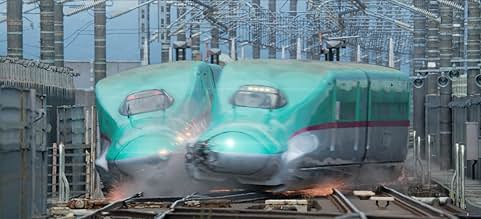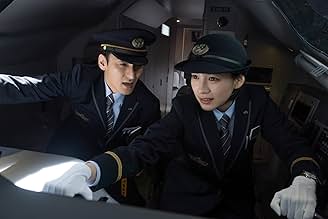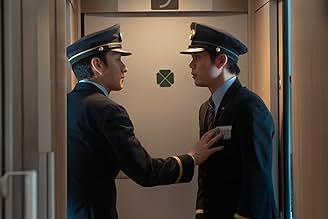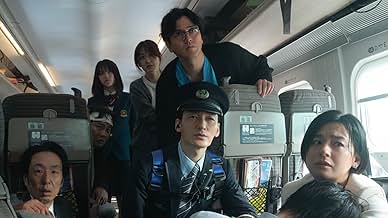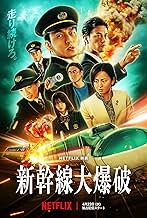IMDb RATING
6.2/10
7.4K
YOUR RATING
A group who straps bombs to a Japanese bullet train in an attempt to extort money from the government.A group who straps bombs to a Japanese bullet train in an attempt to extort money from the government.A group who straps bombs to a Japanese bullet train in an attempt to extort money from the government.
Featured reviews
"Bullet Train Explosion" is an action movie that feels like they used to make back in the day. It's reminiscent of "Speed" with Bullock and Reeves, but swaps the bus for a runaway train. It's perfect for passing the time lightly and enjoyably. It's not an Oscar-worthy film, but it's pleasant to watch despite its long runtime. The effects are decent, and some actors shine in their roles. That said, when it comes to the big reveal of the villain, you can't help but raise an eyebrow and mutter, "Seriously, that's the bad guy?"-it's a bit of a letdown.
I recommend it to anyone looking for an action flick to enjoy with a side of popcorn.
I recommend it to anyone looking for an action flick to enjoy with a side of popcorn.
An affectionate and well-realised update of Junya Sato's The Bullet Train, Bullet Train Explosion's devotion to delivering relentless edge-of-your-seat thrills ensures it's a blast from the moment it leaves the station. After his masterful reworking of Ultraman 3 years ago, I've been patiently waiting for Shinji Higuchi's next film. While the visual effects, direction, cinematography and camerawork are all top-notch, the carnage feels relatively restrained compared to Higuchi's prior work. However, even then, the film's greatest strength lies in its construction of tension and its commitment to showing how people respond to chaos. Some rise while others fall. Even with Higuchi as the film's conductor, this is still very much a one-track film, where Sato's original cross-cuts the action on board its Shinkansen with Ken Takakura's criminal antics, and here we are solely dedicated to the action on board. Despite its familiarity, there's also a fair dose of originality, although the late-game villain reveal had me howling with unintentional laughter. It's a long journey, full of near misses and assorted beats of suspense; although it abandons the complicating human factors that gave the original its soul, the film works very effectively as both a remake and a legacy sequel alike, even if the first half is far stronger than its latter half. Backed by strong performances and a rousing score by Taisei Iwasaki, Bullet Train Explosion is an effectively solid action disaster throwback, full of collectivism and collaboration.
If you're looking a lazy afternoon-watch this weekend that doesn't want you to think too much, this Japanese-version of 'Speed' but on a Bullet Train might be worth considering.
The film was fairly decent until the major reveal that was not really convincing at all, but if you forceful yourself to apply the logic you often see in the news about 'bad actors', you could maaaaybe see why/how it all makes sense.
But like I said, if you don't want to think too much, or at all, this might be one of the decent films for this weekend, or even for passive viewing as you do the dishes or fold your clothes away. Could have been so much better but I didn't care that it was not that and it doesn't feel like a let down.
The film was fairly decent until the major reveal that was not really convincing at all, but if you forceful yourself to apply the logic you often see in the news about 'bad actors', you could maaaaybe see why/how it all makes sense.
But like I said, if you don't want to think too much, or at all, this might be one of the decent films for this weekend, or even for passive viewing as you do the dishes or fold your clothes away. Could have been so much better but I didn't care that it was not that and it doesn't feel like a let down.
With all due respect to my fellow critics-whose insights I genuinely admire-I must gently (but firmly) tap the brakes on this recurring assertion that Bullet Train Explosion is little more than a Japanese Speed. Yes, both films hinge on the same pulse-quickening premise: a vehicle that must maintain velocity or detonate spectacularly. But before we declare Speed the originator of this trope, let's give history its proper due-and a little reverence.
Because long before Keanu Reeves fired off "Pop quiz, BLEEP," and Sandra Bullock white-knuckled her way into action-movie legend, there was The Bullet Train (Shinkansen Daibakuha, 1975). A Japanese thriller that introduced the world to a high-speed train wired to explode if it dipped below a certain speed. Sound familiar? It should. This was the first film to plant a bomb squarely under the concept of velocity. And it was brilliant.
But the lineage doesn't stop there. Even Speed's screenwriter, Graham Yost, credited his inspiration not as some divine spark, but as a cinematic handoff from Runaway Train (1985)-another nail-biter about an unstoppable locomotive hurtling toward oblivion. Here's where it gets even juicier: Runaway Train was originally the brainchild of none other than Akira Kurosawa. Yes, that Kurosawa. The auteur behind Seven Samurai and Rashomon. He wrote the screenplay in the 1960s, envisioning a deeply human, existential thriller set aboard a runaway engine. Though he never got to direct it, his vision survived and roared to life years later under Andrei Konchalovsky.
So let's be clear: Bullet Train Explosion isn't some derivative knockoff trailing behind Speed. It's part of a long, cross-cultural cinematic tradition that spans continents and decades. It stands proudly in a lineage that includes Kurosawa, Konchalovsky, and yes, Jan de Bont. To reduce it to "Speed, but Japanese" is to miss the point-and miss the artistry.
As a Gen-Xer, Speed is sacred to me. It defined a decade of action cinema. It made "mass transit terrorism" an oddly specific genre. And it will always be brilliant. But brilliance doesn't need to be first. And homage is not theft-it's a love letter. Bullet Train Explosion is exactly that: a loud, stylish, blood-soaked valentine to its forebears.
So instead of side-eyeing the similarities, let's celebrate the shared DNA. Let's honor Bullet Train Explosion as a continuation-not a copy-of a global cinematic conversation about speed, stakes, and what happens when you can't stop moving.
With admiration for my fellow Speed disciples (I am one of you), and with cinematic history riding shotgun, I rest my case.
Because long before Keanu Reeves fired off "Pop quiz, BLEEP," and Sandra Bullock white-knuckled her way into action-movie legend, there was The Bullet Train (Shinkansen Daibakuha, 1975). A Japanese thriller that introduced the world to a high-speed train wired to explode if it dipped below a certain speed. Sound familiar? It should. This was the first film to plant a bomb squarely under the concept of velocity. And it was brilliant.
But the lineage doesn't stop there. Even Speed's screenwriter, Graham Yost, credited his inspiration not as some divine spark, but as a cinematic handoff from Runaway Train (1985)-another nail-biter about an unstoppable locomotive hurtling toward oblivion. Here's where it gets even juicier: Runaway Train was originally the brainchild of none other than Akira Kurosawa. Yes, that Kurosawa. The auteur behind Seven Samurai and Rashomon. He wrote the screenplay in the 1960s, envisioning a deeply human, existential thriller set aboard a runaway engine. Though he never got to direct it, his vision survived and roared to life years later under Andrei Konchalovsky.
So let's be clear: Bullet Train Explosion isn't some derivative knockoff trailing behind Speed. It's part of a long, cross-cultural cinematic tradition that spans continents and decades. It stands proudly in a lineage that includes Kurosawa, Konchalovsky, and yes, Jan de Bont. To reduce it to "Speed, but Japanese" is to miss the point-and miss the artistry.
As a Gen-Xer, Speed is sacred to me. It defined a decade of action cinema. It made "mass transit terrorism" an oddly specific genre. And it will always be brilliant. But brilliance doesn't need to be first. And homage is not theft-it's a love letter. Bullet Train Explosion is exactly that: a loud, stylish, blood-soaked valentine to its forebears.
So instead of side-eyeing the similarities, let's celebrate the shared DNA. Let's honor Bullet Train Explosion as a continuation-not a copy-of a global cinematic conversation about speed, stakes, and what happens when you can't stop moving.
With admiration for my fellow Speed disciples (I am one of you), and with cinematic history riding shotgun, I rest my case.
But this is really good! I like the 3D-effects regarding to the bullet train and I green screen effects where they made it exceptionally clear. In perspective this not really realistic as it is in Japan, 'cause it's too much of actions. But in general I liked the actor's character more their personalities that fits into the movie. I was surprised about the character's performance regarding to bomber that planted the bomb on the train. That felt so good with the twist in the good way. However that is, I'm not gonna spoil it. So watch the movie and enjoy actions felt with sweat and tears. You'll not regret it!
Did you know
- TriviaThere is a character named Chiba. Sonny Chiba starred in the original Bullet Train in 1975.
- ConnectionsRemake of Super Express 109 (1975)
Details
- Release date
- Country of origin
- Official site
- Language
- Also known as
- Pánico en el tren bala
- Filming locations
- Production companies
- See more company credits at IMDbPro
- Runtime2 hours 14 minutes
- Color
- Sound mix
- Aspect ratio
- 2.35 : 1
Contribute to this page
Suggest an edit or add missing content



